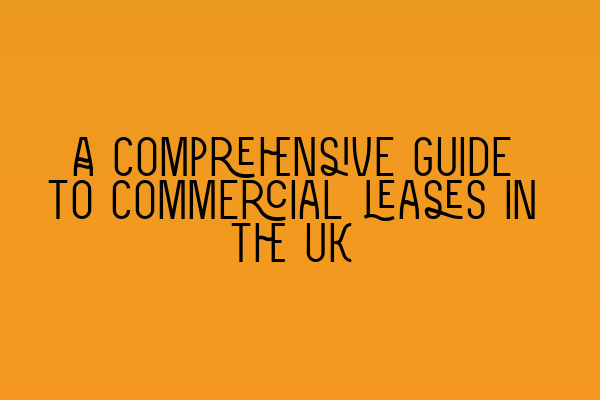A Comprehensive Guide to Commercial Leases in the UK
Welcome to our comprehensive guide to commercial leases in the UK! Whether you’re a business owner or a property investor, understanding the intricacies of commercial leases is crucial for success in the commercial property market. In this guide, we will walk you through everything you need to know about commercial leases, from the basics to the more complex aspects of the process.
What is a Commercial Lease?
Firstly, let’s start with the basics. A commercial lease is a legally binding contract between a landlord and a tenant for the rental of a commercial property. Unlike residential leases, commercial leases typically involve longer terms and higher rents, reflecting the nature of business activities carried out in commercial premises.
Commercial properties can include office buildings, retail spaces, industrial units, and more. These leases come with a range of rights and responsibilities for both landlords and tenants, which we will delve into in the following sections.
Types of Commercial Leases
There are various types of commercial leases, each with its own features and considerations. The most common types include:
- Full Repairing and Insuring Lease (FRI): The tenant is responsible for all repair and maintenance costs and must also take out insurance for the property.
- Internal Repairing Lease (IRL): The tenant is responsible for repair and maintenance of internal areas, while the landlord maintains the external structure.
- Effective Full Repairing and Insuring Lease (EFRI): The tenant is responsible for internal and external repairs, maintenance, and insurance.
- License to Occupy: A more informal agreement granting the tenant permission to use the premises without the same legal obligations as a lease.
Each type of lease has its own advantages and disadvantages, so it’s important to choose the right one based on your specific requirements and circumstances.
Important Clauses in Commercial Leases
Commercial leases contain various important clauses that outline the rights and responsibilities of both parties. Some of the key clauses include:
- Rent and Rent Review: The rent amount and any provisions for rent review during the lease term.
- Term of Lease: The duration of the lease, including any options to renew.
- Break Clause: A provision allowing either party to terminate the lease early, subject to specific conditions.
- Use Clause: Specifies the permitted use of the premises and any restrictions.
- Repair and Maintenance: Details the responsibilities for repair and maintenance, which can vary depending on the type of lease.
- Alienation: Governs the tenant’s ability to assign or sublet the premises.
- Service Charges: Outlines the tenant’s contribution towards the costs of maintaining and managing the common areas of the property.
- Insurance: Details the insurance requirements for both the landlord and the tenant.
Understanding these clauses and their implications is crucial before entering into a commercial lease agreement as they can impact your rights and obligations throughout the lease term.
Considerations for Landlords and Tenants
For landlords, leasing commercial property offers a lucrative investment opportunity. However, it’s essential to carefully consider the following:
- The financial standing of potential tenants
- The suitability of the property for the tenant’s business
- The tenant’s proposed use of the premises
- The length of the lease and rent reviews
On the other hand, tenants should consider the following before entering into a commercial lease:
- Their business requirements and the suitability of the property
- The lease term and any options to renew
- The financial obligations, including rent and service charges
- The potential for expansion or relocation
It’s highly recommended for both landlords and tenants to seek legal advice from an experienced property solicitor to ensure their interests are protected and to negotiate the best possible terms for their business.
Conclusion
Commercial leases are complex legal documents that require careful consideration and understanding. We hope this comprehensive guide has provided you with valuable insights into commercial leases in the UK.
If you’re preparing for your SQE exams and looking for practice exam questions or mock exams, be sure to check out our SQE 1 Practice Exam Questions and SQE 1 Practice Mocks FLK1 FLK2. We also offer comprehensive preparation courses for both SQE 1 and SQE 2 exams. For more information, visit our SQE 2 Preparation Courses and SQE 1 Preparation Courses. Stay updated with the latest SRA SQE exam dates by visiting our SRA SQE Exam Dates page.
Remember, if you have any questions or need assistance with commercial leases, our team at SQE Property Law & Land Law is here to help. Contact us today to schedule a consultation with one of our expert solicitors!
